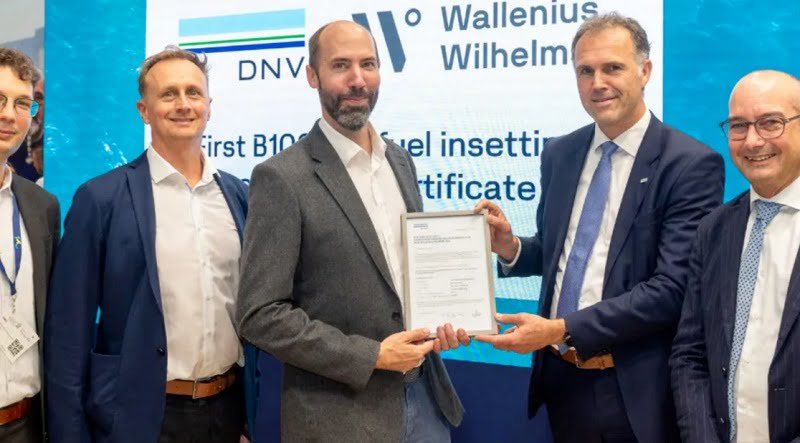Wallenius Wilhelmsen has been awarded its first biofuel insetting verification statement from DNV, recognizing the company’s use of 100% biofuel (B100) during a recent voyage. This milestone marks a significant step in the company’s sustainability efforts, showcasing its commitment to reducing greenhouse gas (GHG) emissions in line with industry decarbonization goals.
During the verified voyage, the MV Morning Post bunkered B100 Biofuel at the Port of Antwerp-Bruges, with the fuel sourced entirely from sustainable feedstocks. Over the course of the scheduled voyage, the vessel achieved a 90% reduction in CO2 equivalent emissions on a well-to-wake basis, demonstrating the potential of biofuels in reducing the carbon footprint of global shipping.
Table of Contents
Verified Biofuel Insetting: A Path to Transparency
The award marks DNV’s first commercial verification of biofuel insetting using 100% biofuel. This verification is part of a larger industry initiative to create transparency across the supply chain by implementing a “book and claim system.” This system enables shipowners and operators to credibly track and verify their GHG reductions, ensuring that their sustainability investments are accurately reflected in the form of verifiable, tangible benefits.
Biofuels, such as B100, offer an immediate and significant impact on reducing shipping emissions. However, they often come at a higher cost compared to traditional fossil fuels. Through verified insetting, companies like Wallenius Wilhelmsen can ensure their investments in biofuel are beneficial not only in terms of environmental compliance but also in delivering real, measurable emission reductions.
Jørgen Westrum Thorsen, Senior Manager of Sustainability at Wallenius Wilhelmsen, emphasized the company’s leadership in the transition to sustainable shipping. “Our ambition is to lead the transformation of our industry towards a decarbonized future,” said Thorsen. “The increased utilization of sustainable biofuels will play a crucial part in meeting our net-zero 2040 commitment. Working closely with DNV to ensure verified emission reductions for our customers is a significant step forward.”
This journey towards net-zero is supported by Wallenius Wilhelmsen’s multi-pronged sustainability strategy, which includes a growing reliance on biofuels such as B100 and B30. These fuels are seen as key components in the company’s strategy to lower emissions while meeting the increasingly stringent environmental regulations imposed by national and international bodies.
Building Trust in a Carbon-Conscious Economy
Morten A. Lerø, Managing Director of DNV Maritime Advisory, highlighted the importance of verified biofuel insetting in building trust in sustainability initiatives across the maritime industry. “Biofuel insetting is emerging as a crucial solution for companies looking to reduce their carbon footprint and meet regulatory targets,” Lerø stated. “It not only helps shipping companies meet their decarbonization goals but also creates new business models and expands the market for sustainable services.”
Lerø emphasized the need for independent, trusted assessments in the absence of global standards or a universal accounting system for emission reductions. “Shipping companies and their customers need to trust that their sustainability efforts are based on rigorous standards and verifiable results. This is why we are proud to work with Wallenius Wilhelmsen, helping to build this trust as they continue to lead the way in greening shipping.”
Wallenius Wilhelmsen’s Commitment to Sustainable Shipping
The increasing use of drop-in biofuels, such as B100 and B30, is a critical element of Wallenius Wilhelmsen’s decarbonization strategy. These fuels provide a seamless integration into existing ship engines without requiring major modifications, allowing shipping companies to reduce their emissions without significant operational disruption.
Wallenius Wilhelmsen’s long-term sustainability vision is deeply embedded in its operations, from ship design and fuel choice to customer partnerships and innovative logistics solutions. As the global shipping industry moves towards greener alternatives, the company’s focus on biofuels demonstrates its leadership in promoting a sustainable and compliant future for maritime transport.
By adopting biofuel insetting verification, Wallenius Wilhelmsen continues to break new ground in its pursuit of a decarbonized maritime industry, leading the way towards a greener future for shipping.
About Wallenius Wilhelmsen
Wallenius Wilhelmsen is a global leader in roll-on/roll-off (RoRo) shipping and vehicle logistics, specializing in the distribution of cars, trucks, heavy machinery, and breakbulk cargo worldwide. With a fleet of around 130 vessels operating across 15 trade routes on six continents, the company provides comprehensive logistics solutions, including a global inland distribution network, 120 processing centers, and eight marine terminals.
Headquartered in Oslo, Norway, Wallenius Wilhelmsen employs over 8,200 people in 29 countries, all dedicated to building sustainable supply chains for the future of mobility and transport on land and sea. The company’s sustainability strategy includes the reduction of emissions and the implementation of cutting-edge technologies to meet its net-zero 2040 commitment.
Wallenius Wilhelmsen operates one of the most environmentally efficient fleets in the RoRo segment, supported by advanced software systems that ensure real-time cargo tracking and streamlined logistics operations. Its dedication to decarbonizing shipping is central to its vision of creating a more sustainable future for the global supply chain.
Source Wallenius Wilhelmsen

